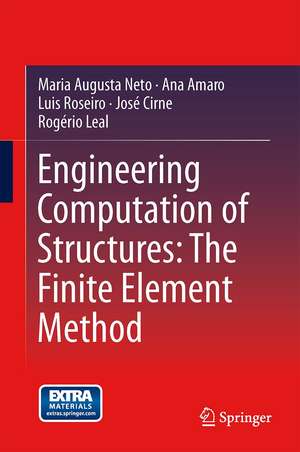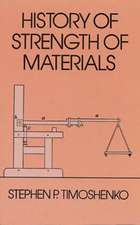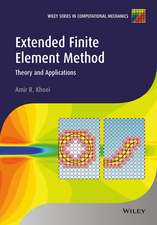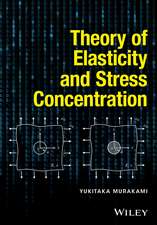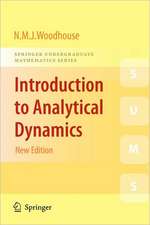Engineering Computation of Structures: The Finite Element Method
Autor Maria Augusta Neto, Ana Amaro, Luis Roseiro, José Cirne, Rogério Lealen Limba Engleză Hardback – 8 oct 2015
Readers of this text are encouraged to discover the proper relationship between theory and practice, within the finite element method: Practice without theory is blind, but theory without practice is sterile.
Beginning with elasticity basic concepts and the classical theories of stressed materials, the work goes on to apply the relationship between forces, displacements, stresses and strains on the process of modeling, simulating and designing engineered technical systems. Chapters discuss the finite element equations for static, eigenvalue analysis, as well as transient analyses.
Students and practitioners using commercial FEM software will find this book very helpful. It uses straightforward examples to demonstrate a complete and detailed finite element procedure, emphasizing the differences between exact and numerical procedures.
| Toate formatele și edițiile | Preț | Express |
|---|---|---|
| Paperback (1) | 728.28 lei 6-8 săpt. | |
| Springer International Publishing – 23 aug 2016 | 728.28 lei 6-8 săpt. | |
| Hardback (1) | 897.81 lei 6-8 săpt. | |
| Springer International Publishing – 8 oct 2015 | 897.81 lei 6-8 săpt. |
Preț: 897.81 lei
Preț vechi: 1094.89 lei
-18% Nou
Puncte Express: 1347
Preț estimativ în valută:
171.79€ • 180.33$ • 142.59£
171.79€ • 180.33$ • 142.59£
Carte tipărită la comandă
Livrare economică 10-24 aprilie
Preluare comenzi: 021 569.72.76
Specificații
ISBN-13: 9783319177090
ISBN-10: 3319177095
Pagini: 290
Ilustrații: XIII, 314 p.
Dimensiuni: 155 x 235 x 104 mm
Greutate: 0.64 kg
Ediția:1st ed. 2015
Editura: Springer International Publishing
Colecția Springer
Locul publicării:Cham, Switzerland
ISBN-10: 3319177095
Pagini: 290
Ilustrații: XIII, 314 p.
Dimensiuni: 155 x 235 x 104 mm
Greutate: 0.64 kg
Ediția:1st ed. 2015
Editura: Springer International Publishing
Colecția Springer
Locul publicării:Cham, Switzerland
Public țintă
ResearchCuprins
1 Mechanics of Solids and Structures.- 2 Introduction to Finite Element Method.- 3 Finite Element Method for Trusses.- 4 Finite Element Method for Beams.- 5 Finite Element Method for Membranes (2-D Solids).- 6 Finite Element Method for Plates/Shells.- 7 Finite Element Method for 3D Solids.- 8 Advanced FEM Modelling.
Recenzii
“This book is intended for a course on the finite element method for linear static and dynamic structure problems. It consists of eight chapters. … The book may be useful for those interested in doing finite element simulations of linear problems in solid mechanics and structures.” (Weimin Han, Mathematical Reviews, May, 2016)
Textul de pe ultima copertă
This book presents theories and the main useful techniques of the Finite Element Method (FEM), with an introduction to FEM and many case studies of its use in engineering practice. It supports engineers and students to solve primarily linear problems in mechanical engineering, with a main focus on static and dynamic structural problems.
Readers of this text are encouraged to discover the proper relationship between theory and practice, within the finite element method: Practice without theory is blind, but theory without practice is sterile.
Beginning with elasticity basic concepts and the classical theories of stressed materials, the work goes on to apply the relationship between forces, displacements, stresses and strains on the process of modeling, simulating and designing engineered technical systems. Chapters discuss the finite element equations for static, eigenvalue analysis, as well as transient analyses.
Students and practitioners using commercialFEM software will find this book very helpful. It uses straightforward examples to demonstrate a complete and detailed finite element procedure, emphasizing the differences between exact and numerical procedures.
Readers of this text are encouraged to discover the proper relationship between theory and practice, within the finite element method: Practice without theory is blind, but theory without practice is sterile.
Beginning with elasticity basic concepts and the classical theories of stressed materials, the work goes on to apply the relationship between forces, displacements, stresses and strains on the process of modeling, simulating and designing engineered technical systems. Chapters discuss the finite element equations for static, eigenvalue analysis, as well as transient analyses.
Students and practitioners using commercialFEM software will find this book very helpful. It uses straightforward examples to demonstrate a complete and detailed finite element procedure, emphasizing the differences between exact and numerical procedures.
Caracteristici
Presents case studies of explicitly applied finite element theories Discusses the finite element equations for static, eigenvalue analysis, as well as transient analyses Provides numerous step-by-step tutorials to help readers learn FEM concepts quickly Collates useful finite element method theories and techniques from practice
